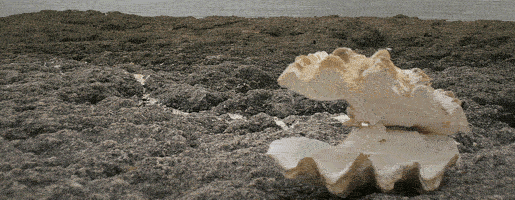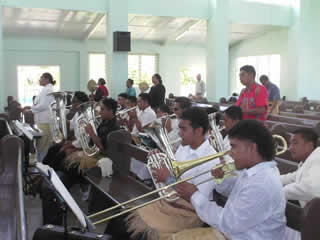 |
|

|

FAMILY AND CHURCH are the two pillars of
life in Tonga, and what could be better than that? Work and Play, Career
and Travel, Power and Glory, the Haves and the Have Mores? There's really
no contest in my mind. The Tongans have it right, and they have been at
it for 3,000+ years so I trust their wisdom on this score. Here at the left
is the King of Tonga, Tupou VI with his family at church. I have often
heard others from outside of Tonga decry the supposed travesty of the
missionaries influence, usually right after I describe the Tongans modesty.
"Oh my, that's too bad they don't all run around nearly naked anymore?"
It's too bad for whom, I ask you? It's really too bad for the papalangi
visitors who would like for Polynesia to comform to the mythical fantasy
they bring with them to the Pacific. Contrast this with the rather unreal
places like those in Tahiti, where the super wealthy rent vacation bungalows
at the daily rate that exceeds the monthly income of it's workers. There one
finds the young hula girls performing a characterization of the fantasy. Tonga
is a real place with really nice people who actually live, worship and play
here. So if I have burst your bubble on that 'noble savage fantasy' it needed
to go anyway.
Papalangi is a word I hear a lot, or rather it's common
abbreviation 'Palangi'. That's what they call me. Papa means to cut or
to break and langi means sky. The first white skinned visitors were Schoten
& LeMare and Able Tasman in the 17th century. Their ships coming over
the horizon "broke the sky" and thus the new word. Most of the
time when I am at a Tongan gathering, I am the only white person there
and you get accustomed to it. Mostly they don't mean it as an insult, they
are just not accustomed to having me around. The sight of a white skinned person
on any of the islands outside of the capitol or the yacht harbor in Vava'u
is unusual most of the time and so they are understandably surprised. But there
is the other side of this name calling. Especially among the youth the use of
Palangi is clearly racist, the same as when Hawaiians called me Haole. Sadly
it goes farther than just wayward youth, as sometimes at teachers' meetings my
colleagues don't refer to me by name but by my 'racial category'. But on
the street when children point and say Palangi, they are surprised. Sometimes
a tourist will fail to grasp this, and even to feel singled out unfairly.
I have even seen European tourists racing through town on bicycles, nearly
running over pedestrians in an effort to avoid contact with Tongans.
 That
is really sad because the Tongans have a lot to share, given the chance.
Music is a big part of why I love Tonga. The best places to hear singing
are at two of the most traditional activities in Tongan life; in church
and at kava parties. Anyone can go to church and hear the music. I am
usually at the Free Wesleyan church that is close to my school, associated
with it, and where the students go. The students performed "Worthy
Is the Lamb" by Handel at the church recently, about 140 singing
and 12 brass players, but the church has their own children's choir (pictured
here), a men's choir, a women's choir, they sing together most often as
a combined choir, and they have a church band too. I go to other churches
sometimes. There are other Methodist sects; the Free Church of Tonga, the Church
of the Chiefs, and the Church of Tonga where they sing the 'hiva usu'
(Tongan composed hymns). Their choirs often have many small girls singing
at high decibels. There are also Catholic and Seventh Day churches, and
the Mormons are here too.
That
is really sad because the Tongans have a lot to share, given the chance.
Music is a big part of why I love Tonga. The best places to hear singing
are at two of the most traditional activities in Tongan life; in church
and at kava parties. Anyone can go to church and hear the music. I am
usually at the Free Wesleyan church that is close to my school, associated
with it, and where the students go. The students performed "Worthy
Is the Lamb" by Handel at the church recently, about 140 singing
and 12 brass players, but the church has their own children's choir (pictured
here), a men's choir, a women's choir, they sing together most often as
a combined choir, and they have a church band too. I go to other churches
sometimes. There are other Methodist sects; the Free Church of Tonga, the Church
of the Chiefs, and the Church of Tonga where they sing the 'hiva usu'
(Tongan composed hymns). Their choirs often have many small girls singing
at high decibels. There are also Catholic and Seventh Day churches, and
the Mormons are here too.
 This
church just bought new instruments not too long ago, are'nt they nice,
with everyone in their Easter white uniforms? Kava is an important social
and ceremonial part of Tongan life. It has a double-sided nature. At night
you can find many kava parties, especially on Fridays. But sometimes,
men will have a little too much kava, making them 'kona' (tipsy). Some
men will imbibe in this manner a little too often, say perhaps every night
from 5pm until dawn for example. At this point the use of kava takes on
a seemy negative character. The positive side is the more common one.
Before special church services all the elders and ministers will always
have kava. They will have a kava party associated with just about anything,
really. Kava has no alcohol, it is a very mild depressant drug. Kava is
made from the powdered roots of a pepper plant. The rest of the plant
is not used, and there are no peppers either. Attending a kava party means
sitting cross-legged and drinking lots of mostly water for several hours,
interspersed with singing and talking. They really like to eat candy and
unfortunately smoke cigarettes, but if you want to experience the singing
it's a small price to pay. A good place to find a kava party is at the
fire station and kava, candy or cigarettes make nice gifts to bring.
This
church just bought new instruments not too long ago, are'nt they nice,
with everyone in their Easter white uniforms? Kava is an important social
and ceremonial part of Tongan life. It has a double-sided nature. At night
you can find many kava parties, especially on Fridays. But sometimes,
men will have a little too much kava, making them 'kona' (tipsy). Some
men will imbibe in this manner a little too often, say perhaps every night
from 5pm until dawn for example. At this point the use of kava takes on
a seemy negative character. The positive side is the more common one.
Before special church services all the elders and ministers will always
have kava. They will have a kava party associated with just about anything,
really. Kava has no alcohol, it is a very mild depressant drug. Kava is
made from the powdered roots of a pepper plant. The rest of the plant
is not used, and there are no peppers either. Attending a kava party means
sitting cross-legged and drinking lots of mostly water for several hours,
interspersed with singing and talking. They really like to eat candy and
unfortunately smoke cigarettes, but if you want to experience the singing
it's a small price to pay. A good place to find a kava party is at the
fire station and kava, candy or cigarettes make nice gifts to bring.
 The
traditional dress for men in Tonga is the wraparound skirt that extends
below the knee but above the ankle, called a tupenu, over which is a shorter
woven wrap called a ta'ovala. The women wear dresses and over that is
a woven kiekie wrap, similar to the ta'ovala only more ornamental like a
beaded curtain. When a member of the family has died, they will wear larger
ta'ovala over black clothes, but the Tongans prefer black clothing in
general, especially the teachers (faiako) and preachers (faifekau), some
who wear long frock coats especially within the Church of Tonga. The women
will swim fully clothed, and the sight of a bikini would be positively
scandalous. Women's bathing suits are worn only at beaches provided for tourist resorts,
such as at Pangaimotu island in Nuku'alofa (the capitol). At schools the
kids all wear uniforms, the color of which is predetermined by the denomination:
dark blue is Wesleyan, light blue is Catholic, orange is Church of Tonga,
green is Mormon, red is Seventh Day, and dark red is the government schools. The government
high schools are exclusive, taking the highest scoring students. But the
government primary schools (GPS) are provided for those who can't afford
a church school, and are the lowest quality schools.
The
traditional dress for men in Tonga is the wraparound skirt that extends
below the knee but above the ankle, called a tupenu, over which is a shorter
woven wrap called a ta'ovala. The women wear dresses and over that is
a woven kiekie wrap, similar to the ta'ovala only more ornamental like a
beaded curtain. When a member of the family has died, they will wear larger
ta'ovala over black clothes, but the Tongans prefer black clothing in
general, especially the teachers (faiako) and preachers (faifekau), some
who wear long frock coats especially within the Church of Tonga. The women
will swim fully clothed, and the sight of a bikini would be positively
scandalous. Women's bathing suits are worn only at beaches provided for tourist resorts,
such as at Pangaimotu island in Nuku'alofa (the capitol). At schools the
kids all wear uniforms, the color of which is predetermined by the denomination:
dark blue is Wesleyan, light blue is Catholic, orange is Church of Tonga,
green is Mormon, red is Seventh Day, and dark red is the government schools. The government
high schools are exclusive, taking the highest scoring students. But the
government primary schools (GPS) are provided for those who can't afford
a church school, and are the lowest quality schools.